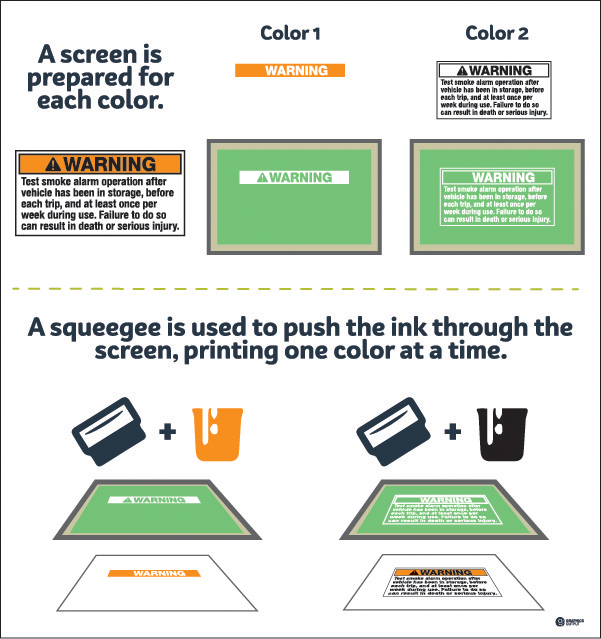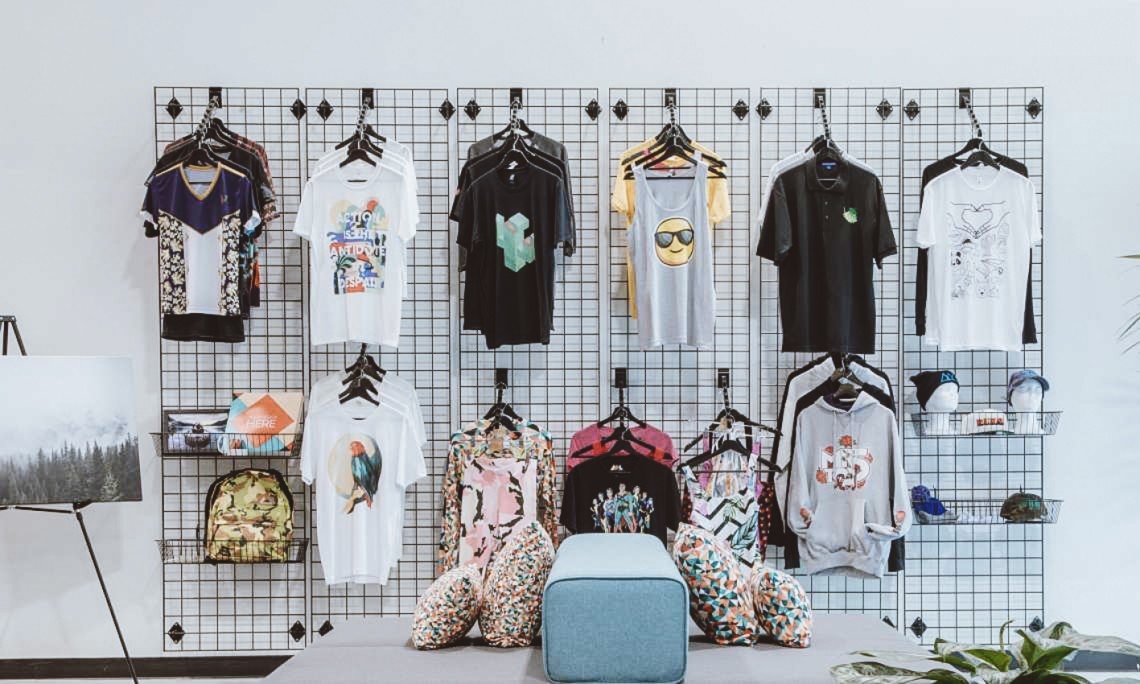More About Tx Tees
Table of ContentsThe Ultimate Guide To Tx TeesThe Ultimate Guide To Tx TeesSome Ideas on Tx Tees You Should KnowHow Tx Tees can Save You Time, Stress, and Money.6 Easy Facts About Tx Tees ExplainedNot known Factual Statements About Tx Tees Get This Report on Tx Tees
That brings your total amount to around $1,900 gross and shipping. Include up other costs, like the variety of utilities it requires to run the shop and the price of ink and emulsion per layout. embroidery shop. Take the print below for instance. This is a one-color photo, so the expense of ink per t-shirt is about 20 cents.The emulsion should only be a few cents since you 'd only need to coat one display for this work. Normally, printers try to make up to 45% profit on a print job.

With DTF, you can print a handful of tee shirts, or just one. Utilize the same calculator as the section above to calculate just how much earnings you 'd use DTF transfers. Contrast the costs and earnings to whichever approach speaks ideal to your configuration and procedure. Both screen printing and DTF have their particular niches in the globe.
The Tx Tees PDFs
The finest means to recognize? Ask about and see what printing shop like your own are doing. screen printer. Try both out and see which you like much better
When you're selecting what kind of printing technique to use for publishing your artwork layouts on your garments, it is essential that you know the differences between these 2 strategies so you can take full advantage of results while decreasing prices. Display printing is the most typically used technique for printing layouts on fabrics.
DTG printing is likewise understood as spot or direct to garment printing due to the fact that it publishes only what is needed as opposed to making a display as display printers do. https://canvas.instructure.com/eportfolios/2821438/Home/Get_Creative_with_TX_Tees_Your_Ultimate_Screen_Printing_Shop. Screen printing works by display filler squeegee screen printing ink display mesh screen, after that transferring the picture to garment using warm and/or stress
The DTG printer uses unique dye-sublimation inks that are used into a pre-designed photo by a digital printing system. The inks enter into the fabric, enabling for vivid colors and phenomenal detail. It's likewise called spot or straight to garment printing due to the fact that it prints only what is required as opposed to making a screen as screen printers do.
The Definitive Guide to Tx Tees
Initially, it's much faster - you can print a fullcolor picture in minutes, as opposed to hours for screen printing. Second, there's no set up time or costs involved - you can publish any design you such as, without having to develop a display. Third, there's no waste - due to the fact that display printers screen print one design at once, they have to evaluate each shade individually.
The paper is extremely costly and can only be made use of as soon as. Once it's printed on, it has to be disposed of. - The first acquisition price is less than the upfront investment of DTG printers- You can print multi-color styles one display at a time rather of having to publish each color separately like DTG printing.

The Buzz on Tx Tees
Rather of using screen mesh as screen printers do, color sublimation printers make use of laser modern technology to move your pictures onto garments or paper. A warm procedure transfers the color from its solid-state directly into the gas phase which subsequently fuses it onto fabric substratums when they are rapidly warmed to heats under high stress.
Sublimation printing is environmentally friendly. It uses much less water than screenprinting, and due to the fact that it doesn't involve using harmful solvents, it's risk-free for all sorts of apparel. The color sublimation inks are likewise odorless Recommended Reading when treated, unlike display printers that use dangerous chemicals throughout the screen printing process that leave an unpleasant smell.
They additionally save money on costly tools like exposure devices since color sublimation printers do not call for a UV direct exposure unit or a flash cure stove that is generally used in screen printing (screen printer). What is straight to garment printing (DTG Printing)? DTG printing is an electronic screenprinting procedure that publishes directly onto material making use of specialized inkjet printers
All About Tx Tees
DTG printing offers numerous advantages over conventional screenprinting, consisting of the capacity to print photographic quality images, higher shade vibrancy, and the ability to publish layouts on darker fabrics. DTG printers work by heating the fabric ink up until it develops into a gas. The gas after that penetrates the textile, bonding with the fibers to produce a long-term print.

Display printers just prepare their display then start printing till they lack product or ink.- There is a variety of skilled display printers throughout the world, which can be handy for novices. - It's a slower process - screen printers typically have to await the ink to dry before they can print the following shade- Screen printers need hands-on labor, so there's a greater learning contour and it takes longer to generate a high-grade design- Screen printing isn't as precise as DTG printing, so you may get some "bleeding" of shades from one part of the image onto one more if not done appropriately.
4 Simple Techniques For Tx Tees
Nevertheless, as opposed to utilizing display mesh as display printers do, color sublimation printers use laser modern technology to transfer your photos onto garments or paper. A warmth procedure moves the dye from its solid-state directly right into the gas phase which consequently merges it onto textile substratums when they are rapidly heated up to heats under high pressure.
Sublimation printing is environmentally friendly. It makes use of less water than screenprinting, and because it doesn't entail the use of harmful solvents, it's secure for all kinds of clothing. The color sublimation inks are additionally unsmelling when healed, unlike display printers that make use of dangerous chemicals throughout the screen printing process that leave behind an undesirable odor.
They also save cash on costly devices like direct exposure systems since dye sublimation printers do not require a UV exposure device or a flash cure stove that is commonly utilized in display printing. What is straight to garment printing (DTG Printing)? DTG printing is an electronic screenprinting procedure that prints straight onto textile utilizing specialized inkjet printers.
The Only Guide for Tx Tees
DTG printing provides many advantages over typical screenprinting, consisting of the capability to print photo top quality pictures, greater shade vibrancy, and the capacity to print designs on darker textiles. DTG printers work by heating the fabric ink up until it turns right into a gas. The gas then permeates the textile, bonding with the fibers to produce a permanent print.